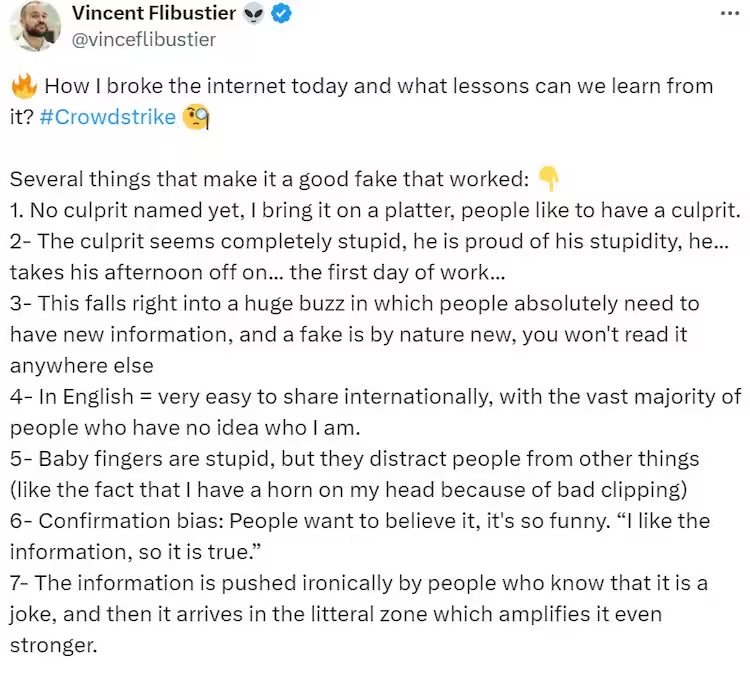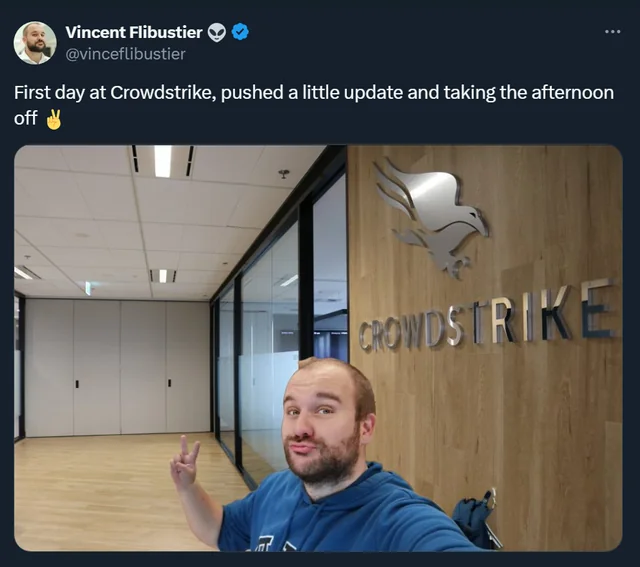The Good
- Humour Amidst Crisis: Vincent Flibustier’s satirical take on the situation provided a moment of levity during a global crisis. Amidst widespread panic, his joke offered a brief respite and a much-needed laugh for many, showcasing the importance of humour in diffusing tension.
- Highlighting Media Literacy: The incident underscored the critical need for media literacy. As thousands fell for the spoof, it became evident how crucial it is for individuals to verify information before accepting it as truth. This serves as a valuable lesson in an era where misinformation spreads rapidly.
- Public Awareness: By going viral, Flibustier’s post inadvertently raised public awareness about cybersecurity issues. People who might not typically follow tech news were suddenly discussing antivirus software updates and IT infrastructure, highlighting the interconnectedness of modern digital systems.
- Encouraging Vigilance: The incident reminded both individuals and organizations of the importance of cybersecurity vigilance. The widespread impact of the outage demonstrated how a single software update could have far-reaching consequences, encouraging more robust testing and monitoring processes.
- Promoting Critical Discussions: The viral nature of the satire sparked discussions about the role and responsibilities of tech companies like CrowdStrike and Microsoft. It highlighted the need for transparency and accountability in tech-related incidents, fostering a dialogue on improving industry standards and practices.

The Bad
- Spread of Misinformation: Vincent Flibustier’s parody, while humorous, contributed to the spread of misinformation. Many people believed he was genuinely responsible for the outage, which created additional confusion and panic during an already stressful situation.
- Undermining Seriousness: The satire may have undermined the severity of the situation. The global IT outage had significant repercussions for businesses and individuals, and the joke potentially diverted attention from addressing the real issues at hand.
- Potential Security Risks: The viral post could have inadvertently highlighted vulnerabilities within the systems of major tech companies. This public exposure may invite malicious actors to exploit perceived weaknesses, posing additional security risks.
- Distrust in Tech Companies: The incident may have eroded trust in CrowdStrike and Microsoft. Users affected by the outage might question the reliability of these companies, leading to reputational damage and potential loss of business.
- Abuse and Harassment: Flibustier’s joke attracted both praise and vitriol. The backlash included abusive messages, illustrating the toxic nature of online discourse and the potential personal risks for those involved in viral events, even satirical ones.

The Gist
Vincent Flibustier, a satirical writer, gained widespread attention by posing as a CrowdStrike employee allegedly responsible for a global IT outage. His spoof, which included an AI-generated photo and a video taking responsibility for the incident, quickly went viral. While many found humour in the post, others believed it was genuine, leading to significant confusion and additional panic during the tech crisis.
The actual cause of the outage was a defective update to CrowdStrike’s Falcon Sensor software, which affected Microsoft Windows systems worldwide. This led to widespread disruptions across various sectors, including emergency services, airlines, and banks. Despite assurances from CrowdStrike that the issue was not due to a cyberattack, the event highlighted serious vulnerabilities in software update processes and the heavy reliance on single-point technologies.
Flibustier’s parody underscored the ease with which misinformation can spread on social media, emphasizing the need for critical media literacy and vigilance in verifying information. The incident also sparked discussions on the responsibilities of tech companies in ensuring robust cybersecurity measures and the importance of having redundant systems to prevent such widespread outages in the future.
The Take
The recent global IT outage caused by a faulty software update from CrowdStrike has stirred significant public and media attention. This incident, which led to disruptions in essential services worldwide, was further complicated by a satirical social media post from Vincent Flibustier. Flibustier, a known satirical writer, posed as a CrowdStrike employee taking responsibility for the outage, which caused additional confusion and panic among affected users.
The outage began with an update to CrowdStrike’s Falcon Sensor software, designed to enhance cybersecurity for Windows systems. Unfortunately, the update contained defective code, leading to what is known in the industry as the “blue screen of death” (BSOD) on numerous computers. This issue had a cascading effect, disrupting critical services such as emergency call centres, airlines, banks, and hospitals, highlighting the interdependence of modern technological infrastructure.
Amidst this chaos, Vincent Flibustier’s satirical post went viral. He shared an AI-generated photo of himself outside the CrowdStrike office with the caption, “First day at Crowdstrike, pushed a little update and taking the afternoon off.” The post, intended as a joke, was taken seriously by many, leading to further confusion. Flibustier even updated his social media bio to read, “Former Crowdstrike employee, fired for an unfair reason, only changed 1 line of code to optimize. Looking for a job as Sysadmin,” adding fuel to the fire.

The viral nature of Flibustier’s post highlighted several critical issues. Firstly, it underscored the rapid spread of misinformation on social media. Many users, already frustrated and seeking answers, quickly latched onto the apparent confession, spreading it further without verifying its authenticity. This incident serves as a stark reminder of the importance of media literacy and the need for individuals to critically evaluate information before accepting it as truth.
Furthermore, the satire highlighted vulnerabilities within major tech companies. CrowdStrike, a leading cybersecurity firm, and Microsoft, whose Windows operating system is widely used globally, were both placed under intense scrutiny. The incident exposed the potential risks associated with relying on single-point technologies and the significant impact that a single software update can have on a global scale.
In response to the outage, both CrowdStrike and Microsoft have been working to resolve the issue and restore normalcy. The defective update has raised questions about the quality control processes in place for software updates. Experts suggest that more rigorous testing and validation procedures are necessary to prevent similar incidents in the future. Additionally, there is a call for greater redundancy in IT infrastructure to ensure that a single point of failure does not lead to widespread disruptions.
The incident has also sparked discussions about the role of regulatory bodies in overseeing the tech industry. Some experts and lawmakers have suggested that additional regulatory guardrails may be necessary to prevent such large-scale outages. However, others argue that the market will naturally drive improvements in quality control and cybersecurity practices without the need for government intervention.
From a broader perspective, this incident serves as a wake-up call for both tech companies and users. For companies, it emphasizes the need for robust cybersecurity measures, rigorous testing of updates, and the implementation of redundant systems to ensure business continuity. For users, it highlights the importance of critical thinking and media literacy in navigating the digital landscape.
Vincent Flibustier’s satirical post, while humorous to some, inadvertently amplified the chaos of the situation. His actions underscore the dual-edged nature of social media, where information can spread rapidly, but not always accurately. The incident serves as a reminder of the power and responsibility that comes with digital communication and the importance of verifying information before spreading it further.
As the world becomes increasingly interconnected, the repercussions of such incidents are magnified. The CrowdStrike outage and the ensuing confusion caused by Flibustier’s post underscore the need for heightened vigilance in cybersecurity and media consumption. Moving forward, it is imperative for tech companies to learn from this incident, implement stronger safeguards, and for users to approach digital information with a critical eye.




